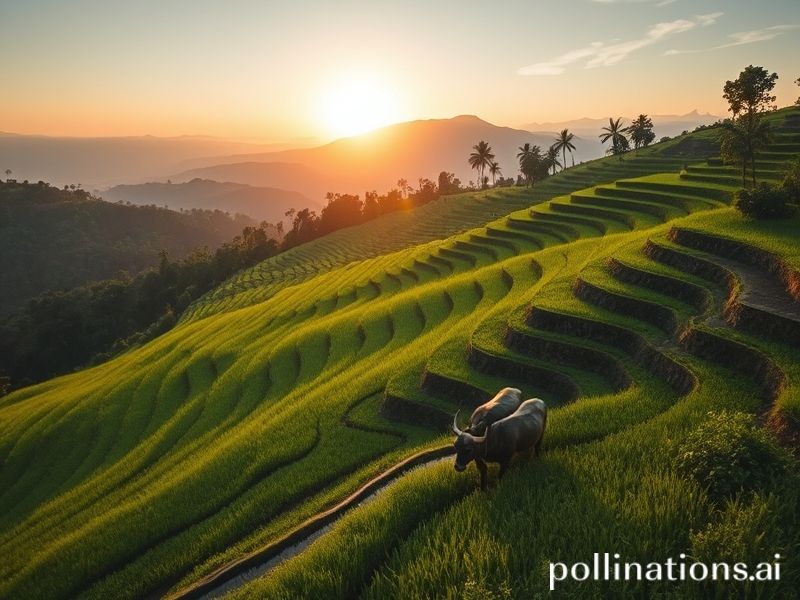Indonesia at 273 Million: The Volcanic Reality Show Everyone’s Streaming but No One’s Scripting
Indonesia: 273 Million People, 17,000 Islands, and One Giant Reality Show Called “Globalization”
By a Correspondent Who’s Learned to Drink Luwak Coffee Without Asking Too Many Questions
JAKARTA—From the air, Indonesia looks like someone spilled coffee on a map of the planet and then tried to mop it up with a sari. Seventeen-thousand-odd islands, three time zones, and a population roughly equivalent to every single person in the Americas deciding to live on a tropical archipelago and argue about traffic. If Earth ever needs a poster child for “beautiful chaos,” Jakarta’s skyline—equal parts glass towers and billboards for instant noodles—will do nicely.
But don’t mistake the archipelago for a mere Instagram backdrop. Indonesia is the world’s fourth-most-populous country, the largest Muslim-majority democracy, and—since last year—home to the planet’s largest single-site nickel mine, conveniently located next to a coastline that’s sinking faster than the government’s approval ratings. Nickel, for the uninitiated, is what makes your virtue-signaling electric car go “vroom” instead of “clunk.” Global automakers now bow toward Sulawesi five times a day, praying that the locals don’t realize they can hold the world’s battery supply hostage for a better cut of the royalties. Spoiler: they’re starting to realize.
Meanwhile, in the digital realm, Indonesians spend an average of eight hours a day online, mostly debating whether rendang should be crispy (absolutely not) and doom-scrolling about the next earthquake. That screen addiction has turned the country into TikTok’s fourth-largest market—right behind the U.S., Brazil, and the collective fever dream we call “the algorithm.” Western pundits who once fretted about Islamic populism now worry more about 20-year-olds lip-syncing to slowed-down K-pop while their coastline disappears beneath them like a Snapchat story on a 24-hour timer.
Climate-wise, Indonesia is the world’s third-largest emitter when you count forest fires and peatland drainage—Mother Nature’s own passive-aggressive carbon accounting. Every dry season, Kalimantan and Sumatra set themselves alight so that Singapore can enjoy the surreal experience of sunshine that smells like a barbecue hosted by lung cancer. The government’s solution? A “Zero Burning” policy enforced by drones that cost more per hour than the average farmer sees in a year. Results remain mixed, much like the haze.
On the geopolitical chessboard, Indonesia is the queen that refuses to move in a straight line. It flirts with China on infrastructure (who else will build 33 airports at once?), winks at the U.S. on defense (hello, new F-15s), and ghostwrites ASEAN communiqués so bland they could substitute for melatonin. Washington calls this “strategic autonomy”; Beijing calls it “Tuesday.” The truth is that Indonesia would rather sell nickel to both sides than pick one. Can’t fault the hustle—everyone else is doing it, but only Jakarta manages to look serene while juggling Molotov cocktails.
Economically, the country’s middle class now numbers 70 million, which sounds impressive until you remember that the poverty line is drawn just above the ability to afford an overpriced Starbucks latte. Still, the malls are full, the GoJek drivers are unionizing via WhatsApp, and venture-capital missionaries from San Francisco keep arriving with PowerPoints about “super-apps” and “financial inclusion.” Some leave with dengue; all leave with stories about traffic jams that double as existential metaphors.
And yet, despite the smog, the sinking capital, and the occasional tsunami, Indonesia persists—cheerfully, chaotically, and with a national motto that translates, roughly, to “Unity in Diversity, Now Please Don’t Ask About Papua.” The world keeps shipping its minerals, swiping its content, and praying its tectonic plates stay quiet for one more fiscal quarter. Meanwhile, 273 million people wake up every morning to a sunrise that looks like a Bob Ross fever dream and think, “Well, at least we’re not Belgium.”
In the end, Indonesia is not a country so much as a planetary stress test: Can 21st-century capitalism, Islamic democracy, and environmental collapse coexist on a chain of volcanoes? The experiment is ongoing, the data is messy, and the control group—everyone else—keeps pretending they’re not watching. Pass the luwak coffee; the civets have already done their part.







